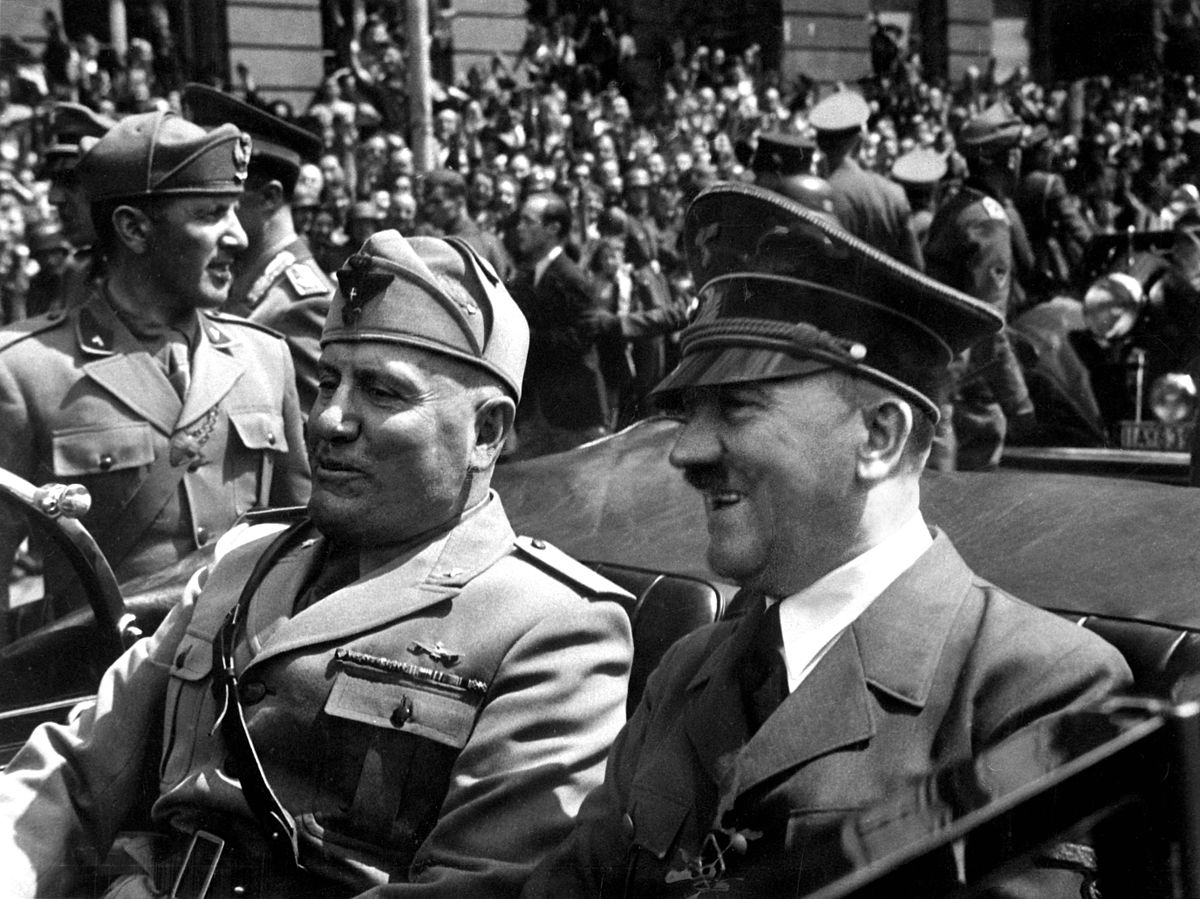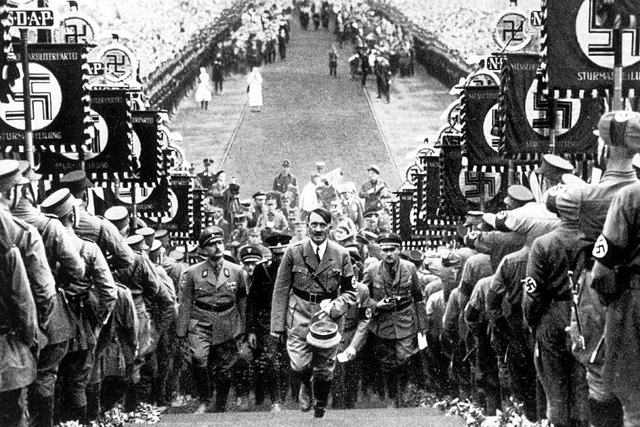The election of Donald Trump in the US and the rise of Marine Le Pen in the French presidential elections has naturally been received with alarm by millions of people around the world. Some have even warned of a new rise of fascism. As Marxists, we feel it is important not to replace serious analysis with scaremongering and exaggeration. In this article, Rob Sewell - editor of Socialist Appeal - asks: what is fascism? And does it pose an imminent threat today?
With the victory of Trump in America and the rise of Le Pen and the Front National (FN) in France, together with the rise of other right-wing parties in Europe, it has become common in liberal and radical circles to describe these individuals and movements as fascist. Even some on the Left have adopted this description. For instance, the British Socialist Workers Party’s paper declares Le Pen as “fascist” and described her entry into the second round of the French presidential elections as meaning “the fascists were on the rise.” The SWP has set up a front organisation, United Against Fascism, which has called protests with the main slogans, “No to Le Pen! No to the return of Fascism in Europe!”
This hysteria about the immediate “rise of fascism” is wildly alarmist and completely misunderstands the real situation facing us. This induced panic is a hallmark of the liberal and sectarian groups, which see the spectre of fascism around every corner. They toss around words like “fascist” as a term of abuse or swear word against all manner of reactionary politicians, rather than offering a sober appraisal of the situation.
The anti-immigrant and racist Front National in France is certainly a reactionary organisation. But in its outlook and approach it is now more in line with other traditional right wing parties. In fact, the closer it gets to power, the more “respectable” it becomes. Marine Le Pen even expelled her own father and founder of the NF for anti-semitic remarks in order to make the party more electable. She tries to sound as mainstream as possible, even to the extent of stealing lines from a speech by defeated centre-right candidate François Fillon in an attempt to lure his voters.
The NF is certainly not modelled on the genuine fascist parties of Hitler and Mussolini of the 1930s.
Some may argue that parties like the FN are nevertheless reactionary and that we should not be too pedantic. However, Marxists are scientific socialists who understand that any successful cure of a disease depends upon a precise diagnosis. We do not bandy about words like “fascist” as mere terms of abuse. In order to combat fascism, it is first necessary to understand it. It is therefore important to cut through the fog of confusion and stupidity which characterises the thinking of the sects, left reformists and middle class radicals on this question.
We recognise the reactionary filth poured out by the Front National and other such racist organisations. We know this poison represents a sinister threat to the working class, one which seeks to sow divisions in the workers’ movement. The rise in the number of attacks on immigrants is also a serious issue. Nevertheless, we need to differentiate between fascism, which represents a qualitatively different scale of attack - the total destruction of workers’ rights, its organisations and the enslavement of the working class - and other forms of reaction.
We must learn to distinguish one from another in order to be able better to fight it.
Learn from history
We are all aware of the tale of the little boy who cried wolf once too often, so that when the real thing came along nobody believed him and he was gobbled up. Those who cry “fascism” at every turn are making the same mistake. This was precisely the blunder of the German Communist Party in the late 1920s, which described every capitalist party as “fascist”, making no distinction between them. More devastatingly, they applied this label to the reformist workers organisations, calling them “social fascists”. This fatal policy caused the maximum confusion in the German workers’ movement, tragically splitting the German working class, who were delivered prostrated before the Hitler juggernaut.
Our task as Marxists is to learn from history, especially from its mistakes, and not to lose our head at every twist and turn of events. We also have to recognise, as well as analyse, the qualitative differences between now and the 1930s, especially the changed balance of class forces.
The first real Marxist analysis of fascism was made by Leon Trotsky, not in hindsight, but during the rise in Europe of fascism itself. He regarded fascism not simply as capitalist reaction but a special form, “the distilled essence of imperialism”, that threatened the very existence of the workers’ organisations.
Crisis of the traditional parties
Of course, this does not mean that we ignore the rise of right-wing racist parties, which are a product of the crumbling of the old liberal order. This in turn is the product of the effects of the capitalist crisis, which has turned everything on its head. This crisis of the capitalist system also means a crisis of the traditional parties, including the social democratic parties, which completely accept the market economy.
The old consensus has therefore been shattered. The ruling class can no longer rule in the old way. The deeper the crisis, the more they are forced to ruthlessly attack the working class and take back the gains of the past. The capitalist system cannot any longer afford such “luxuries” as decent healthcare, education, pensions and welfare for working class people and their families. This, in turn, is provoking resentment and anger against the capitalist order. This explains the rise of so-called “populism”.
The capitalist state
The capitalist state machine, when stripped of its inessential features, can be reduced, in the words of Engels, to “armed bodies of men”. Even in its most “democratic” form of parliamentary democracy, the state continues to possess its police force, army, judges, prison wardens and bureaucracy to safeguard the power of the ruling class. In other words, capitalist democracy is really just the disguised dictatorship of the banks and monopolies. For them, this method of class rule is the most stable form of bourgeois state. So long as they are able to continue to rule by these means, the ruling class has no need to resort to fascism or open dictatorship.
In times of acute crisis, however, this is not always a viable option. Under such circumstances, where the capitalist politicians are too weak and discredited to rule by the old methods, and where the working class is not ready to take power, the state can assume great powers and the “armed bodies of men” can rise above the classes. Splits and divisions open up in the ruling class as they squabble about how to proceed. Only a revolutionary party can end this deadlock and offer a way forward. However, if the workers organisations are not up to the task, the initiative can fall to a party of “law and order”, balancing between the classes, and rising itself up as an independent arbiter. Marx described this as the “rule of the sword”. The prime task of such a regime is to defend the existing capitalist property relations, while taking a slice of the loot for themselves.
This regime is what Marxists call Bonapartism, or military-police dictatorship, after the dictator Napoleon Bonaparte. The “Bonaparte” balances between the different classes and groups, playing one off against the other but always coming down on the side of private property. There have been many of these military juntas at different times and different countries throughout the twentieth century, from Greece in the 1960s and Chile and Argentina in the 1970s, as well as in the latter years of Franco’s Spain and Salazar's Portugal until their overthrow.
Bonapartism is a product of complete instability and reflects an insoluble crisis within society. However, even Bonapartism can prove insufficient to resolve the problem. It can keep the lid on things for a time, but sooner or later it becomes exhausted.
A human battering ram
In the 20th Century epoch of world wars and revolutions, capitalism gave birth to new forms of reaction, more ruthless and terrifying than before. The decay of the capitalist system gave rise to armed hoodlum gangs with which to counter the working class, intimidate and murder its representatives, destroy its organisations and undermine its resolve. The Black Hundreds in Russia and the Freikorps in Germany were examples of such auxiliaries to the organs of state repression. However, even these counter-revolutionary gangs, which employed ruthless terrorism, were not strong enough to completely smash the workers’ organisations. This required something special; it required a mass fascist movement.
No ruling class in history has been squeamish in acting ruthlessly to defend its power and privileges.
For example, a point was reached in the crisis in Europe between the two world wars when the very existence of the workers organisations was deemed incompatible with the existence of capitalism. The trade unions and workers’ parties were considered an obstacle to the enslavement of the working class. Resolving this problem for the bosses could not be accomplished by laws or decrees from on high.
This task required the services of fascism, a mass movement of reaction, based upon a frenzied middle class and what Marx called the lumpen proletariat, the most ground-down, disorganised and backward elements of the working class, ready in the words of Trotsky to “believe in miracles”. Its system of informers and spies penetrate into every housing block, institution and school. Its mass base allows it to penetrate far deeper into the fabric of society than any military-police regime. This is its most distinguishing feature in being a mass movement of counter-revolution. Unlike a military police state, which lacks a mass social base, fascism destroys all vestiges of democratic rights and organisation and atomises the working class.
The fascist bands are recruited from the dregs of society, those ruined by capitalism, peasants bled white by the banks and monopolies, the most demoralised elements of the long term unemployed, de-classed and criminal elements, desperately seeking a way out of their misery. This human trash is fed with demagogy and poison against the greedy bankers and workers’ organisations. They provide the shock troops of the counter-revolution.
Fascism in power
First of all, fascism triumphed in Italy, where the bands of cutthroats organised by Mussolini, armed and financed by the capitalists, took revenge for the revolutionary factory occupations in 1920. Step by step they bombed and murdered their way to power. In Germany, following the betrayal of the revolutionary wave from 1918 to 1923, the fascists were used to terrorise the workers. Eventually, as the crisis reached fever pitch, finance capital poured huge resources into the Hitler movement. They had come to the conclusion that only the destruction of the powerful German workers’ movement would resolve the situation in their favour. With the full compliance of the bourgeois state, they unleashed the fascist counter-revolution, which led to the victory of Hitler in 1933. The bourgeoisie had relinquished state power into the hands of the Fascist brigands and gangsters.
The fascist regimes of Hitler, Mussolini as well as Franco in Spain destroyed all visible opposition to the rule of capital. All resistance was broken. However, as soon as fascism is victorious, the state betrays its social base and degenerates into a Bonapartist regime, propped up by the inertia following the catastrophe. The ruling class is politically expropriated, having lost control over its state. This is a heavy price to pay for saving capitalism. That is why when employing reaction the bourgeoisie prefers the rule through the generals rather than the fascists. The generals are more reliable, linked by marriage, education, social connections, to the banks and monopolies.
Today, in comparison to the pre-war period, the working class is a thousand times stronger. The class balance of forces is weighted overwhelmingly in its favour. The peasantry has been reduced to a tiny proportion in most countries, if it has not been eliminated entirely. The middle class professionals, such as the civil servants, bank clerks and teachers have become increasingly proletarianised. The students, who had overwhelmingly fascist sympathies in the pre-war period, are today firmly on the side of the working class and look towards the left. This means that the classic social reserves of fascism have been completely undermined by the very march of capitalism. Any attempt by the bourgeois even to turn to a military police state would be met today with general strikes and civil war, in which they would not be confident of winning.
The ruling class also burned its fingers over Hitler and the fascists and would not be keen on repeating the experience. Then they lost half of Germany to the USSR as a consequence.
Le Pen and the National Front
Right-wing anti-immigrant parties have certainly increased in Europe but this cannot be compared to the rise of fascism in the 1930s. Far from it. Even if these right-wing parties succeeded in coming to power, they would act like any traditional bourgeois party. The working class is certainly not defeated and would resist any move in this direction.
In fact, a Le Pen government, if it ever came to power, would not be able to solve the problems and would lose support very quickly. It would not stabilise the situation for French capitalism but, on the contrary, would destabilise it, bringing workers and youth out on the streets. There would be the likelihood of a social explosion as in May 1968. That is why big business does not support the FN, despite their traditional parties being in crisis.
In any case there are not only shifts to the right but also shifts to the left, as has been seen with the support for Mélenchon. Support for the Front National has also come from some disenchanted workers, repeatedly betrayed by the leaders of the Socialist Party. But this support for Le Pen is only skin deep. These disillusioned workers could be easily won to a revolutionary position in the future.
Enough scaremongering
The real fascist organisations that do exist have been reduced to small sects, apart from in Greece, where the fascist Golden Dawn has a certain base of support. Even here, the Greek capitalist class are not interested in their services and have placed its leaders in jail. Of course, these “democrats” would not hesitate to unleash these gangs against the workers’ organisations, or use murder and thuggery, to defend their rule if the time came. But that would mean civil war.
While we recognise the threat from the right and mobilise to oppose it, we refuse to engage in scaremongering about the “imminent danger” of fascism, which is complete nonsense. There is no danger of fascism - or even Bonapartist reaction - at the present time in any advanced capitalist country. That could change, however, if the working class was repeatedly defeated and betrayed by its leadership.
Today, with the deep crisis of capitalism, the situation is very favourable for the growth of revolutionary ideas. Of course, the movement to overthrow capitalism will not take place in a straight line. There will be inevitable ups and downs. Periods of stormy advance will be followed by periods of despondency, defeats and even reaction. But every attempt to move in the direction of reaction will prepare an even bigger swing to the left. The bourgeoisie will not resort to open reaction until all other possibilities have been exhausted. Long before this, the workers will have had many opportunities to take power in one country after another. Only after a series of big defeats of the working class would the danger of a military solution be posed.
But we are a very long way from that. In fact, revolutionary explosions are on the order of the day. It is these events that we need to prepare for. In one of Trotsky’s last articles written in 1940, he gives the following advice:
“No occupation is more completely unworthy than that of speculating whether or not we shall succeed in creating a powerful revolutionary leader-party. Ahead lies a favourable perspective, providing all the justification for revolutionary activism. It is necessary to utilise the opportunities which are opening up and to build the revolutionary party.”
That remains the key task today. The perspectives for revolution have never been more favourable than they are now. We must build a powerful Marxist tendency, which can offer a real way out of this impasse, based upon Marxist theory and not upon shrill phrases. Only when the working class assumes power can capitalist reaction and fascism be finally placed in the dustbin of history.

